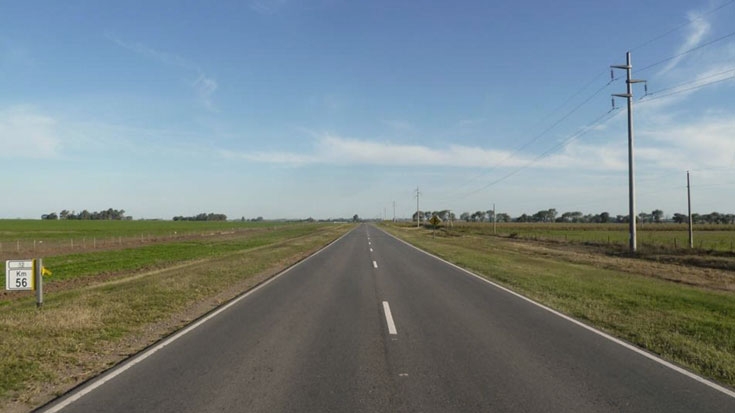Challenge
Despite the province of Córdoba’s contribution to Argentina’s recovery and rapid economic growth following the 2001 crisis, few resources were available to maintain and extend the province’s road network. This led to a severe maintenance backlog, which threatened Córdoba’s growing agriculture and tourism sectors. In 2003 the provincial road sector budget amounted to US$ 26 million at a time when the minimum financial need was estimated to be US$ 80 million. Addressing the most urgent needs in rehabilitation and paving would allow the province to enhance competitiveness and prevent the road infrastructure from becoming a bottleneck to further growth.
Solution
Through the Cordoba Road Infrastructure Project, the World Bank supported the provincial government’s use of performance based rehabilitation and performance contracts, known by their Spanish acronym, CREMA. These contracts have the advantage of committing funds upfront for routine maintenance over an extended period of time, instead of depending on stop-and-go funding for maintenance.
The project partnered with the Ministry of Finance on institutional interventions to improve the quality of provincial expenditures through better project management, monitoring, and evaluation. In addition, the project provided technical assistance to enhance the capacity of the Provincial Directorate of Highways to prioritize and optimize investments through the development of an efficient road network management strategy. The objective of this strategy is to expand and maintain in good condition the road network. Finally, the project collaborated with the provincial government on the comprehensive Road Safety Plan and provided equipment to the Provincial Highway Patrol, which helped to reduce deaths caused by traffic accidents on provincial roads.
Results
Under the CREMA modality, the project financed the paving of 125 km of provincial roads and covered the rehabilitation and maintenance of another140 km of provincial roads. The project’s support for institutional development helped to consolidate the basic building blocks for a performance-based culture in provincial administration.
Some of the projects additional outcomes include:
- Employment generation opportunities increased with new local commercial and agro-industrial centers.
- Access to 38 education centers and 20 health centers improved, with a more permanent presence of medical personnel.
- Mobility and access increased on the order of 120 percent, especially in heavy goods vehicles and more frequent public transport.
- Improved road safety conditions and enforcement mechanisms led to reductions in the mortality rate on provincial and national roads.
Bank Group Contribution
The Bank was a key partner in road safety efforts through technical assistance, knowledge exchange, and cross-fertilization of experiences. The Bank provided financing of US$75 million over the seven-year project implementation period. Also, the project received two grants from the Global Road Safety Facility to finance an International Road Assessment Program survey and a Capacity Assessment Review.
Partners
Project implementation required a strong partnership between the Bank and the Provincial Ministry of Finance, Ministry of Public Works, the Agency for Investment and Financing, Provincial Directorate of Highways, and the Ministry of Government’s Directorate of Road Accidents Preventions (DPAT). All institutional strengthening activities were carried out with the government’s resources and in-house capabilities. Local counterpart financing was US$ 21.54 million. This partnership created a productive synergy between the DPAT, the Road Safety National Agency and the Global Road Safety Facility, and led to the successful development of a provincial road safety plan.
Moving Forward
The Bank foresees no further operation, except for the completion of CREMA contracts under execution as part of the Provincial Roads Project II. The Cordoba Provincial Directorate of Highways has developed its own road maintenance contracts known as “contratos de cobertura,”which are awarded to contractors to provide maintenance services on a certain number of kilometers of road. These contracts have the same objective of CREMA contracts of committing funds upfront for routine maintenance over an extended period of time instead of depending on stop-and-go funding. Provincial Law No. 10,081 ensures financial sustainability of the road maintenance projects by imposing a fuel levy, which is expected to bring in revenues of about US$ 100 million per year.
Beneficiaries
By improving the condition of provincial roads, local users and road transport services directly benefited from the decreased transport costs and upgraded road safety.
Also, the project enhanced access to social services and markets for rural communities. For instance, by paving a 27.2 km road the project facilitated access to the town of La Cumbrecita, one of the province’s cherished tourist attractions.
“The construction of the bridge and pavement of the road that connected our town with Villa General Belgrano and other bigger cities have a high positive impact, because now we can have easier access to supplies, faster emergency care, and also expand special educational courses for kids, like language and music classes.” Emilia Galeano (local business owner, La Cumbrecita)
